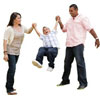Expectations, exhaustion can lead mothers to post-adoption stress
Fatigue and unrealistic expectations of parenthood may help contribute to post-adoption depression in women, according to a Purdue University study.
“Feeling tired was by far the largest predictor of depression in mothers who adopted,” said Karen J. Foli, an assistant professor of nursing who studied factors that could predict depression in adoptive mothers. “We didn’t expect to see this, and we aren’t sure if the fatigue is a symptom of the depression or if it is the parenting experience that is the source of the fatigue. It also may be reflective of a lacking social support system that adoptive parents receive. However, a common thread in my research has been an assumption that if the mum didn’t carry the child for nine months or go through a physical labour, the parents don’t need help in the same manner as birth mothers do.”
Other predictors of depression in adoptive mothers included expectations of themselves as mothers, of the child, and of family and friends, perceived support from friends, self-esteem, martial satisfaction, and parent and child bonding. These findings, published in Advances in Nursing Science, are based on survey results of 300 mothers who had adopted within the past two years. The average age of the children at the time of the adoption was 4.6 years.
There are nearly 1.8 million adopted children in the United States, and Foli’s previous work found that unrealistic and unmet expectations related to parenting, bonding with the child, and support from family and friends were common themes related to depression. She also co-authored the book “The Post-Adoption Blues: Overcoming the Unforeseen Challenges of Adoption.”
Research has clearly established the importance of mental health, particularly depression, in birth parents as a correlate of behaviour and emotional problems in children. Knowing what factors trigger post-adoption depression can help plan effective interventions, she said, to help avoid these problems for children who are adopted. For example, nurses, whether working in a pediatric setting or the mother’s doctor office, could assess for fatigue in adoptive mothers. It’s also important for health-care professionals, family members and others to realise that not all adoptions are equal, Foli said.
“Bonding with the children often comes up in post-adoption depression. If adoptive mothers cannot bond to their child as quickly as they expected, they commonly report feeling guilt and shame,” Foli said. “These parents have the expectation to quickly attach to the child and they see themselves as superparents. But what happens when the child they adopt is a teething toddler or unknown special needs surface? It’s a difficult stage for a parent who has known that child for two years, let alone someone who is establishing a new relationship with the child.”
The study also showed that depressive symptoms were more likely higher for mothers who did not have the complete background or biographical information about children, who, after placement, were considered special needs children. However, depression was not correlated with parents who were aware they were receiving a child with known special needs.
“We also found that mothers of children with different ethnic or racial backgrounds did not report more depressive symptoms than those mothers who did not differ from their children’s ethnic or racial backgrounds,” Foli said. “Interestingly, these mums did report perceiving that society was less accepting of their adoptive family.”
(Source: Purdue University: Advances in Nursing Science)
More Information
 | For more information on parenting, including child development milestones, work-life balance and tips for spending more time with family, see Parenting.
|
Dates
Tags
Created by:

 Login
Login














